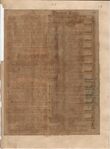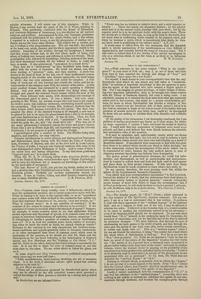Present or Departed?
Sir,— Common sense being usually, even if fallaciously, alleged to meet the spiritualistic position, one is hardly prepared to agree with Mr. White in making it do duty on the opposite side, so as to “apprehend that common sense will draw us back to the conclusion that spirits are what they represent themselves to be, namely, ‘men and women, &c.’” What is common sense? Is it any criterion of certainty? If the evidence of the senses be meant, how is illusion to be avoided? If the assistance of reason be invoked, what is the standard of appeal? Suppose, for example, it seems common sense to me that alphabetic writing should represent only the sound of speech, is it common sense for other people to introduce considerations of authority, history, etymology? Or if orthography be hardly a question of common sense, is Spiritualism more so? If it is, does not common sense teach, rightly or wrongly, that when we leave the world at death, we cannot return at leisure? Evidence to the contrary is not only exceptional, but involves exceptional conditions, and appeals generally either to foregone conclusions, or to other perceptions than those of common sense, which must be inadequate to the purpose, or we should not find Dr. Slade and the Davenports on the one hand believing in the intervention of departed spirits, and Mrs. Hardinge and Mr. Watkins, or Col. Olcott, “T. J.,” and Dr. Wyld on the other, denying that this is always or necessarily the case. It is not fair to claim the voice of common sense on one side more than on the other. We are either above or below the plane, not on it.
In some Angelic and Holy Communications, published anonymously many years ago, we were told that—
“Table manifestations, hand-guiding, drawings, are all of mundane origin. It is the work of abnormal nature; spirit proper has nothing whatever to do with it.”
In Art Magic we read:—
“There are no phenomena produced by disembodied spirits which may not be effected by the still embodied human spirit, provided a correct knowledge of these powers is directed by a strong and powerful will.”
ln Swedenborg we are informed that—
“Every man has an inferior or exterior mind, and a mind superior or interior…. These two minds are altogether distinct; by the inferior mind man is in the natural world, together with men there; but by the superior mind he is in the spiritual world, with the angels there. These two minds are so distinct that man, so long as he lives in the world, does not know what is performing within himself in his superior mind, and when he becomes a spirit, which is immediately after death, he does not know what is performing in his inferior mind.” A.E. 527.
It would seem to follow from the last statement, that the departed spirit is wholly unconscious of the manifestation—a view difficult of apprehension, and certainly beyond the range of common sense. But I take leave to submit that it is not worthy of the careful investigator to rely on a criterion which, to say the least, is as likely to be fallacious as to be true.
January 7th.
What is the Intelligence?
Sir,—With reference to the letter headed “What is the intelligence?” in your issue of 28th ult., may I, as one of those who have from time to time reported the sayings and doings of “Joey” and “Abdullah,” crave space for a few words?
For myself, I must demur to your correspondent’s view that the only hypothesis upon which we can attach any real value to “manifestations” as sources of important knowledge is that the agencies in question are spirits of the departed who have entered a higher sphere of life. For I can imagine no greater privilege, or better means of obtaining very important information, than to be brought into direct contact with the Prince of Darkness himself, did such a being exist. I am absolutely careless as to whether the facts arise from what are commonly called good or bad sources; this might be a proper consideration, perhaps, for those to whom Spiritualism has become a religion, or who permit its control over the emotional side of their nature; but it is in my view so essential to begin on the lowest round of the ladder that any question of morals involved may fairly (nay, ought to) be disregarded by those who are seeking to tabulate facts with scientific and verifiable accuracy.
Of the reality of the phenomena I am thoroughly convinced, but I am guiltless of having propounded any theory as to their origin, for within my large experience I confess I have not found the means of forming any. I could wish that this suspension of judgment were much more general, and that a well-defined line were drawn between the scientific and speculative sides of the question.
It is easy to speculate, and, unfortunately, nearly every one deems himself competent for that task; but it is not so easy to exercise a rigid self-suppression which should fear one’s own individuality as a factor of dangerous import. If speculation were competent to deal with this question, there is no subject which should now stand in fuller daylight; but in this nineteenth century the investigation of the whole matter has to be commended ab initio, because the only method known to man of obtaining accurate knowledge has hitherto been disregarded.
The genius power of generalisation illumines the world but infrequently, and Spiritualists, as well as psychologists and astronomers, must be content to collect facts and facts and facts until it shall appear and place them in their proper relations. If this were done many Spiritualists would be much surprised to learn what a fact really is.
In my opinion, therefore, the most pressing work lies within the sphere of the Experimental Research Committee.
I am afraid that your correspondent’s expectation “to find it proved, beyond the shadow of a doubt, that the phenomena have their source in other than merely human or physical agencies,” scarcely evinces the proper temper of mind with which to begin the investigation; but, if without prejudgment, he will study the facts on the low ground I advocate, he will, doubtless, help to be of good service.
January 1st, 1878.
A Second Pilgrimage Around the World: the Southern Route
...
<... continues on page 4-170 >
Editor's notes
- ↑ Present or Departed? by Fawcett W.W., London Spiritualist, No. 281, January 11, 1878, p. 21
- ↑ What is the Intelligence? by Newton Wm., London Spiritualist, No. 281, January 11, 1878, p. 21
- ↑ A Second Pilgrimage Around the World: the Southern Route by Peebles J.M., Banner of Light, Boston, Saturday, February 2, 1878
Sources
-
London Spiritualist, No. 281, January 11, 1878, p. 21


